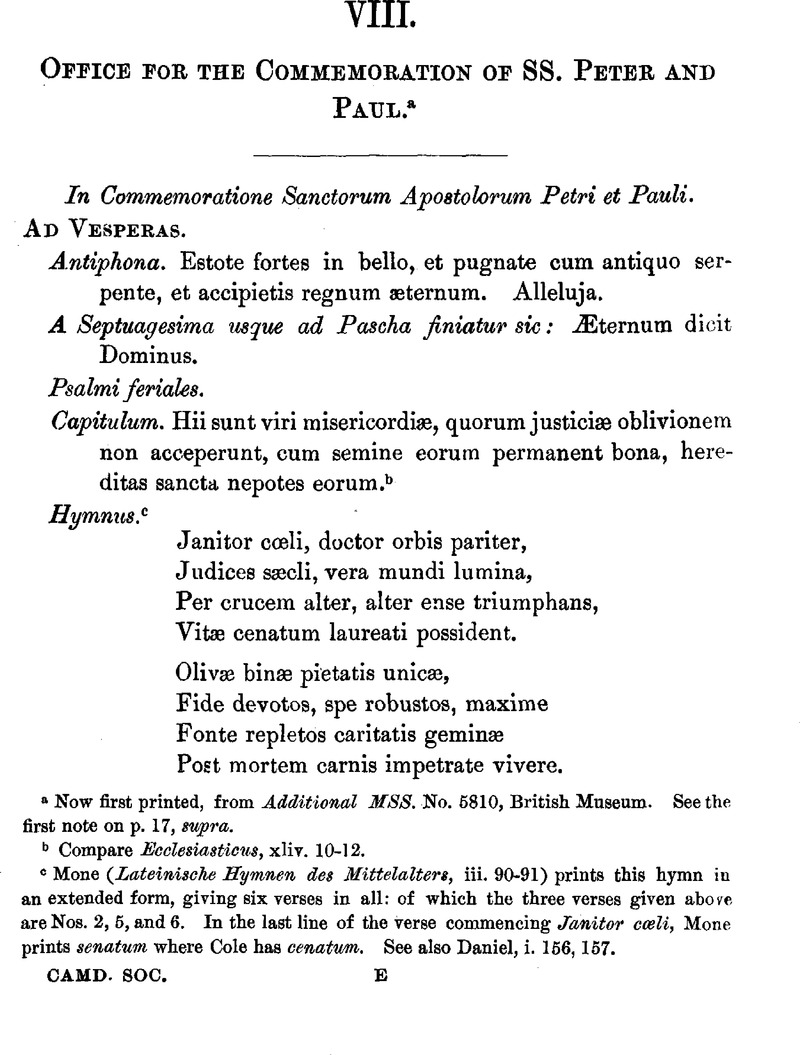No CrossRef data available.
Article contents
VIII. Office for the Commemoration of SS. Peter and Paul.a
Published online by Cambridge University Press: 24 December 2009
Abstract

- Type
- Documents
- Information
- Camden New Series , Volume 26: Documents Illustrating the History of S. Paul's Cathedral , March 1881 , pp. 25 - 34
- Copyright
- Copyright © Royal Historical Society 1881
References
page 25 note b Compare Ecclesiasticus, xliv. 10–12.Google Scholar
page 25 note c Mone (Lateinischs Hymnen des Mittelalters, iii. 90–91Google Scholar) prints this hymn in an extended form, giving six verses in all: of which the three verses given abore are Nos. 2, 5, and 6. In the last line of the verse commencing Janitor cœli, Mone prints senatum where Cole has cenatum. See also Daniel, i. 156, 157.
page 26 note a Introduced from the S. Paul's Missal (Harleian MS. No. 2, 787), which contains this collect.
page 27 note a Added from Sarum Breviary.
page 28 note a Daniel (Thesaurus Hymnologicus, i. 247Google Scholar) prints two forms of this hymn; the one taken from “Libr. Vet.” the other from the “Brev. Rom.” The version presented in the text agrees with the more ancient form.
page 28 note b Sarum Breviary, gloria; Daniel, gloriam.
page 28 note c Daniel prints seras in both versions; Cole, by an error, has ceras.
page 28 note d Supplied from Sarum Breviary. The response is, “Et facta ejus intellexerunt.”
page 28 note e Compare Apoc. xi. 4.
page 29 note a Supplied from Sarum Breviary. The response is, Et in fines orbis terræ verba eorum.
page 29 note b Sarum Breviary. The response is, Memores erunt nominis tui, Domine.
page 29 note c Sarnm Breviary. The response is, Nimis confortatus est principatus eorum
page 30 note a Daniel (Thesaurus Hymnologicus, i. 83Google Scholar) prints the first verse of this Hymn as the fifth verse of Hymn lxxix.; and the second verse, i. 88, as the last verse of Hymn lxxxi. See Brev. Sarum, ii. 356.
page 30 note b Brev. Sar. a mortuis.
page 30 note c Daniel prints the Gloria of this Hymn i. 63; and the first verse i. 206; together with other verses, and the same Gloria as a Hymn of the Venerable Bede.
page 30 note d In Sarum Brev. the response to this verse is, Viso Domino, Alleluia.
page 31 note a Sarum Brey. adds, splendorem Deo dederunt. Alleluia.
page 31 note b See Daniel, , i. 84Google Scholar; and Breviary, Sarum, ii. 358.Google Scholar
page 31 note c Daniel and Sarnm, Christum; Cole, wrongly, Christo.
page 31 note d See ante, p. 30.Google Scholar
page 32 note a See ante, p. 30.Google Scholar
page 32 note b See ante, p. 30.Google Scholar
page 32 note c In the Sarum Breviary, the response is, Rectos decet laudatio, Alleluia.
page 32 note d Sancti tui, Domine, florebunt sicut lilium, Alleluja; et sicut odor balsami erunt ante te, Alleluja.—Sarum Breviary.
page 32 ntoe e ![]() . Preciosa est in conspectu Domini. Alleluja. Alleluja.
. Preciosa est in conspectu Domini. Alleluja. Alleluja.
![]() . Mors sanctorum ejus. Alleluja. Alleluja. Gloria. Preciosa.
. Mors sanctorum ejus. Alleluja. Alleluja. Gloria. Preciosa.
Sarum Breviary.
page 33 note a See Kehrein, , Lateinisehe Sequenzen des Mittelalters, No. 374, pp. 268–9Google Scholar; and Neale, , Sequentiœ ex Missalibus, p. 214Google Scholar, where the whole sequence is printed “e missali Nidrosiensi.”
page 33 note b quam jucunda celebrantur hac mensa convivia. Kehrein and Neale.
page 33 note c Hic nostra sunt ‥ Sint pia laudum carmina. Amen. Kehrein and Neale. The Sarum Missal, however, reads, quam jocunda (though some editions read jam, and others tam), and concludes as in text. See col. 663.*
page 34 ntoe a The full form is:—Et te, Domine, supplicifcer exorare: ut gregem tuum pastor aternus non deseras, sed per beatos Apostolos continua protectione cnstodias. Ut iisdem rectoribus gubernetur: quos operis tui vicarios eidem contulisti præesse pastores.—Sarum Breviary, ii. 487.Google Scholar
page 33 note d The full form is: Justorum animee in mann Dei sunt, et non tanget illos tormentum malitiæ: visi sunt oculis insipientium mori: illi autem sunt in pace.—Sarum Missal, 804.Google Scholar


